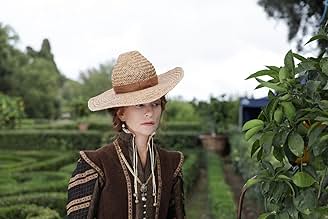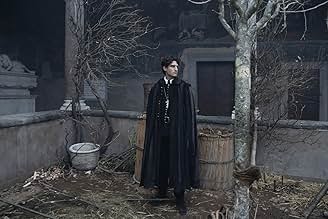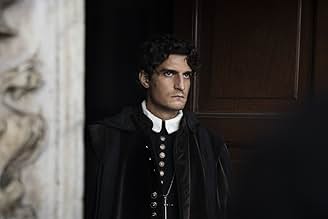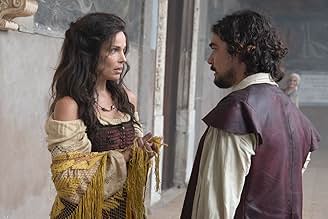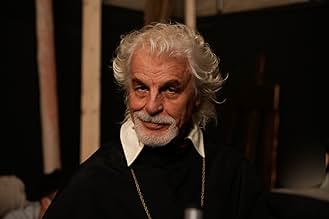IMDb-BEWERTUNG
6,5/10
1918
IHRE BEWERTUNG
Die katholische Kirche ermittelt heimlich gegen Caravaggio, während der Papst abwägt, ob er ihn wegen der Ermordung eines Rivalen begnadigen soll.Die katholische Kirche ermittelt heimlich gegen Caravaggio, während der Papst abwägt, ob er ihn wegen der Ermordung eines Rivalen begnadigen soll.Die katholische Kirche ermittelt heimlich gegen Caravaggio, während der Papst abwägt, ob er ihn wegen der Ermordung eines Rivalen begnadigen soll.
- Regie
- Drehbuch
- Hauptbesetzung
- Auszeichnungen
- 13 Gewinne & 6 Nominierungen insgesamt
Empfohlene Bewertungen
Caravaggio's Shadow is a fever dream of a film, vividly photographed and convincingly played by an (unsurprisingly) handsome Italian cast.
There's plenty of melodrama, but it's an Italian period piece; anything less would have felt restrained.
At the heart of it is an irresolvable contradiction: the Vatican and papacy are the immensely rich and powerful core of Catholicism, but Catholicism is anchored by the teachings of Jesus, friend of the poor, the outcast and the desperate. What happens when the Vatican's most talented painter - a devout genius - uses the poor, the disgraced, and the outcasts of society as his subjects in seeking the truth of scripture?
Expect plenty of debauchery, plenty of on-location renaissance architecture, some intrigue, and even some swashbuckling swordfighting.
Worth your time.
There's plenty of melodrama, but it's an Italian period piece; anything less would have felt restrained.
At the heart of it is an irresolvable contradiction: the Vatican and papacy are the immensely rich and powerful core of Catholicism, but Catholicism is anchored by the teachings of Jesus, friend of the poor, the outcast and the desperate. What happens when the Vatican's most talented painter - a devout genius - uses the poor, the disgraced, and the outcasts of society as his subjects in seeking the truth of scripture?
Expect plenty of debauchery, plenty of on-location renaissance architecture, some intrigue, and even some swashbuckling swordfighting.
Worth your time.
I have watched the movie at the cinema, in Timisoara. The movie looks to carefully illustrate the life of the painter. The actors and the actresses are very nice interpretating their roles. The scenes, the costumes, the colours and the decorations are very loyal to the XVII secol, when Caravaggio lived. The main actor, playing as Caravaggio, is a great actor, full of passion.
It is interesting, and still present on our days) the conflict in understanding what is the good and what is bad, because the bad can be find in good and viceversa. And of course, this is an unique truth for each of us.
Even the movie is 2 hours long, I have not figured out when the time passed.
Congratulations to all actors and for the entire team of the movie!
It is interesting, and still present on our days) the conflict in understanding what is the good and what is bad, because the bad can be find in good and viceversa. And of course, this is an unique truth for each of us.
Even the movie is 2 hours long, I have not figured out when the time passed.
Congratulations to all actors and for the entire team of the movie!
The movie is the story of Michelangelo Merisi da Caravaggio who was an Italian painter in the 16th century, through the eyes of the Pope's investigator. He was known for painting "what he saw", some kind of reality that he wanted close to the divine, which was of course not ok with the Catholic Church. Within his paintings, you could see famous prostitutes, hoboes, represented as saints, such as Mary or St Peter. His life has multiple legends around it, he was known to have sexual relationships with both males and females, while painting for the Church, and his competitors tried to destroy him for that. He had to flee Rome after killing (accidentally?) someone and lived in Naples, Sicily, Malta, etc. The story of the movie is a bit long, but this is not why you should see this movie. The whole movie is staged as a painting, with that kind of atmosphere that you get from 16th century Italian paintings. Would I watch it again? No, but I am happy I watched it.
I saw it as a fair work. For beautiful cinematography, reminding, scene bty scene, the art of Michelangelo Merisi, for Riccardo Scamarcio and his work in skin of Caravaggio, for Isabelle Huppert and Louis Garel, more than inspired crafters of their characters , for music and for good kick to viewer to (re)discover a great artist masterpieces.
Obvious, the film reflects the perspective of Michele Placcido and, I admitt, far to be easy say about the best manner to reflect a life defined by torments, force and shadows like this.
A beautiful film, not perfect, not correct in many details, not exactly for admirers of Caravaggio, simplistic for few reasons but enough for define it more than decent movie , not comparing with Derek Jarman 1986 film or with documentaries across last decades.
Obvious, the film reflects the perspective of Michele Placcido and, I admitt, far to be easy say about the best manner to reflect a life defined by torments, force and shadows like this.
A beautiful film, not perfect, not correct in many details, not exactly for admirers of Caravaggio, simplistic for few reasons but enough for define it more than decent movie , not comparing with Derek Jarman 1986 film or with documentaries across last decades.
L'Ombra di Caravaggio promises a fiery portrait of a tortured genius and instead delivers two hours of overwrought mood lighting, erratic time jumps, and enough theatrical whispering to power an entire semester at drama school.
The film adopts the now-inescapable "non-linear" structure, which in this case means the plot zigzags like a drunk fencing master. Sure they toss in a few time markers, but stylistically it's all one long, indistinguishable swirl of tormented men in cloaks.
Our anti-hero Caravaggio is painted (pardon the pun) as your typical Renaissance bad boy: rebellious, tortured, bisexual, brooding, but also - plot twist! - a devout Catholic. Because nothing screams "believable complexity" like orgies one minute and confessions the next. He's supposed to feel radical, but ends up as a kind of art-school Jesus with eyeliner.
Enter "Ombra," the Church's enforcer and a villain so laughably named it's amazing no one bursts out laughing when he introduces himself. Shadow, really? Why not just call him "Father Oppression" and be done with it? He spends most of the film lurking in corners and embodying the Vatican's greatest hits: repression, judgment, and fabulous robes.
As far as the orgies are concerned, we didn't need quite so many scenes of candlelit debauchery, complete with bored courtesans, snarling pigs, and pouting boys.
To pad things out between the sex and the brooding, the film indulges in lavish re-creations of Caravaggio's paintings, which are admittedly striking - if you enjoy watching actors pose like a diorama in a museum gift shop. At times, it feels less like a biopic and more like an over-budgeted PowerPoint presentation on Baroque composition.
And then there's the ending. Since history has left Caravaggio's death ambiguous, the filmmakers go full fan-fiction and cook up a finale that manages to be both absurd and deeply unsatisfying. One almost expects him to ascend into a ray of divine light, paintbrush in hand.
On the plus side the lighting is gorgeous. Every scene looks like it's been lit by angels and Instagram filters. But beautiful visuals can only carry you so far when the script feels like a Gregorian soap opera.
The film adopts the now-inescapable "non-linear" structure, which in this case means the plot zigzags like a drunk fencing master. Sure they toss in a few time markers, but stylistically it's all one long, indistinguishable swirl of tormented men in cloaks.
Our anti-hero Caravaggio is painted (pardon the pun) as your typical Renaissance bad boy: rebellious, tortured, bisexual, brooding, but also - plot twist! - a devout Catholic. Because nothing screams "believable complexity" like orgies one minute and confessions the next. He's supposed to feel radical, but ends up as a kind of art-school Jesus with eyeliner.
Enter "Ombra," the Church's enforcer and a villain so laughably named it's amazing no one bursts out laughing when he introduces himself. Shadow, really? Why not just call him "Father Oppression" and be done with it? He spends most of the film lurking in corners and embodying the Vatican's greatest hits: repression, judgment, and fabulous robes.
As far as the orgies are concerned, we didn't need quite so many scenes of candlelit debauchery, complete with bored courtesans, snarling pigs, and pouting boys.
To pad things out between the sex and the brooding, the film indulges in lavish re-creations of Caravaggio's paintings, which are admittedly striking - if you enjoy watching actors pose like a diorama in a museum gift shop. At times, it feels less like a biopic and more like an over-budgeted PowerPoint presentation on Baroque composition.
And then there's the ending. Since history has left Caravaggio's death ambiguous, the filmmakers go full fan-fiction and cook up a finale that manages to be both absurd and deeply unsatisfying. One almost expects him to ascend into a ray of divine light, paintbrush in hand.
On the plus side the lighting is gorgeous. Every scene looks like it's been lit by angels and Instagram filters. But beautiful visuals can only carry you so far when the script feels like a Gregorian soap opera.
Wusstest du schon
- WissenswertesRiccardo Scamarcio said about Caravaggio's character: "I immediately thought that [Caravaggio] was like Elvis Presley. My reference was Elvis. A small-town boy with great energy, passion, talent and rigor towards art. At that time, painting was the mainstream, there was nothing else, there was no photography, there was no radio, television or cinema. Paintings were so powerful because they spoke directly to the unconscious. And this man was the first to represent sacred images in a completely different way."
- PatzerAlle Einträge enthalten Spoiler
Top-Auswahl
Melde dich zum Bewerten an und greife auf die Watchlist für personalisierte Empfehlungen zu.
- How long is Caravaggio's Shadow?Powered by Alexa
Details
Box Office
- Budget
- 12.261.966 € (geschätzt)
- Weltweiter Bruttoertrag
- 4.895.695 $
- Laufzeit
- 2 Std.(120 min)
- Farbe
- Seitenverhältnis
- 2.39 : 1
Zu dieser Seite beitragen
Bearbeitung vorschlagen oder fehlenden Inhalt hinzufügen

